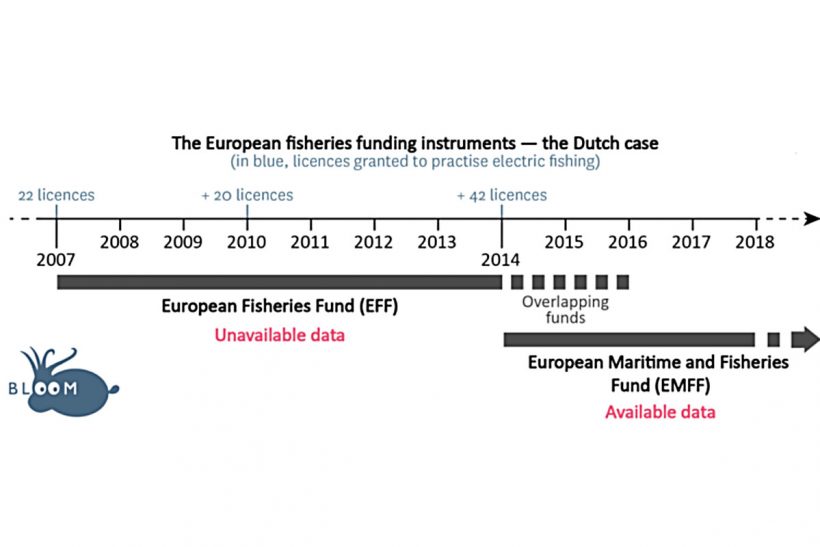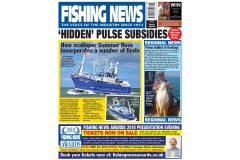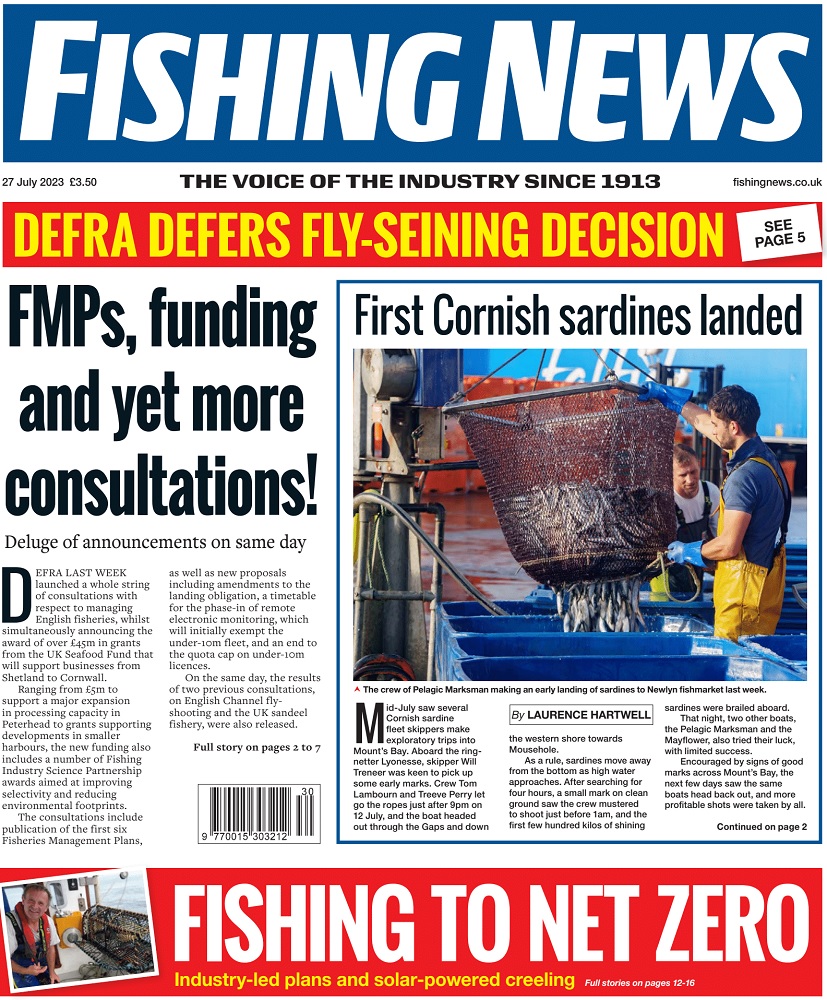Commission ‘complicit’, claims Bloom green group
The green group that is campaigning to ban electric pulse beam trawling in the EU has accused the Dutch government of failing to declare large subsidies it has given to the Dutch pulse fleet, reports Tim Oliver
Paris-based Bloom, headed by Claire Nouvian, has filed a formal complaint to the European Commission against the Netherlands. This follows its first complaint at the end of last year alleging that most of the 84 licences awarded to the Dutch pulse beam fleet are illegal (Fishing News, 18 January, ‘Battle over electric fishing’).
In its second complaint, Bloom says the Dutch government has failed to comply with European law by being the only major fishing nation in Europe that has not published data about the public subsidies that were allocated to Dutch fleets between 2007 and 2014, the period in which ‘the vast majority of conversions’ took place.
Using public data from 2015 onwards, that the Netherlands has made available, Bloom has calculated that the Dutch pulse fleet has received €5.7m of public money since then.
Frédéric Le Manach, Bloom’s scientific director, said: “Since August 2015 alone, the Netherlands has distributed almost €6m to its electric fishing vessels – but the vast majority of conversions took place between 2007 and 2014 (Fig 1). This suggests that a large-scale financial scandal is looming, in addition to the ecological, social and political scandal that we have revealed on this issue.”
Bloom says all other major EU fishing nations except the Netherlands have conformed with the obligation to publicise data showing the beneficiaries of the European Fisheries Fund (EFF) – the financial instrument that granted public subsidies to European fishing fleets for the period 2007 to 2014.
The organisation says the lack of transparency ‘is not accidental’. “The 84 licences that the Netherlands managed to obtain for the use of electricity at sea were granted between 2007 and 2014,” says Bloom’s chair, Claire Nouvian. “That is precisely the period for which Dutch authorities did not comply with the regulatory requirements of transparency.”
She said the context of the scandal was that traditional beam trawlers were going bankrupt because of high fuel consumption, when the solution to all their problems appeared in the form of electric fishing, which ‘triggered a gold rush’.
She said: “For industrial fishers, the fact that the use of electric current destroys the entire ecosystem and puts artisanal fishermen on the brink of extinction is the least of their worries. Not only have they obtained a number of licences well beyond the regulatory framework (30% exemptions instead of 5%), but everything indicates that their actions did not stop there.
“By re-classifying electric fishing as ‘innovative’, instead of ‘destructive’, the Dutch have also managed to obtain millions of euros of public aid.”
Bloom’s electric fishing researcher, Laetitia Bisiaux, said: “The derogations granted to electric fishing did not pursue any scientific objective and had no other purpose than to rescue a destructive and polluting industry. The Netherlands must now reveal to European citizens how much public money was spent on their electric fishing vessels, whether it was for so-called ‘research’ that they never conducted or to equip ships with electrodes.”
Brussels ‘complicit’ in hiding subsidies
Bloom also accused the European Commission of ‘barely-masked complicity’ with the Netherlands over the lack of transparency in publishing details of the subsidies between 2007 and 2014.
The organisation said the Commission had only now responded to its first complaint against pulse beaming with ‘a standard letter which shows that the Commission is trying to evade its political responsibility’.
On 13 April, 2018, the Commission wrote it had transferred Bloom’s complaint to the ‘EU Pilot’. Bloom says this is a system that is supposed to allow ‘an informal exchange of information between the Commission and the member state concerned’.
But according to Claire Nouvian, this ‘pseudo-procedure’ is actually meant to save time, and avoid formally launching an infringement procedure. She said: “The Commission had 12 months after we filed our first complaint to decide whether it would launch a formal procedure against the Netherlands.
“When, after six months, the Commission replied that our complaint was transmitted to an ‘informal’ mechanism whose stated purpose is to avoid, if possible, ‘formal infringement proceedings’, it’s almost a public admission of its bias in favour of those who trample on European law. The Commission is the Guardian of the Treaties, it is supposed to be politically independent.
“If the executive arm of the EU does not defend the general interest and democracy, especially at a sensitive time of trilogue political negotiations, which must decide whether or not to ban electric fishing in Europe, then how much can citizens trust EU institutions?” Claire Nouvian asked.
In a letter to EU fisheries commissioner Karmenu Vella, Bloom and 15 other signatories call on the European Commission to act impartially and to ‘take all necessary measures’ to ensure the Netherlands complies with EU rules, whether it is about the unlawful number of licences or about breaching financial transparency requirements. Signatories include LIFE, COAST and Thanet, Leigh and Southend and Mersea Island fishermen’s associations.
‘Trilogue’ negotiations between the three European institutions (Parliament, Commission and Council), which will decide whether electric fishing is indeed banned in Europe, began in March 2018. On 16 January, 2018, the European Parliament voted, with a very large majority (402 votes to 232), in favour of a full ban on electric fishing.
‘Commission in contact with Dutch authorities’
Asked to respond to the Bloom allegations, a Commission spokesperson told Fishing News: “The Commission is currently in contact with the Dutch authorities to obtain additional information on their licensing regime to verify the respect of the rules.”
An EU official said it was important to clarify that Bloom had raised two different issues that should not be linked. One was the exchange of information with the Dutch authorities and the Commission’s efforts to verify the legality of their actions.
The other was the ongoing trilogue discussions for a new proposal on technical measures.
Licences given under current rules
The official said that under current rules, member states may allow electric pulse fisheries by no more than 5% of their beam trawler fleet in the southern North Sea, subject to technical conditions.
The same rules allow member states to use other types of gear for fishing operations conducted solely for scientific research (Article 43). They do not limit the number of vessels that may use this exemption.
“Under the CFP (Article 14), member states can initiate pilot projects to facilitate the introduction of the landing obligation in respective fisheries and with the aim of reducing unwanted catches,” said the official.
Under these rules, member states must notify the Commission of such projects, but explicit approval is not required. The most recent notification by the Dutch authorities to the Commission under Article 43 was made in October 2017, when the Dutch authorities notified the Commission of a scientific research project in accordance with Article 43 (1) of Council Regulation (EC) No 850/98.
“The Commission, following the complaints, has now requested additional information to verify that the rules are respected,” said the official.
New technical measures proposal (still under discussion)
The new technical measures proposal is not in force but under discussion by the co-legislations. “It is important to clarify that the Commission’s new proposal on pulse fishing was based, as are all proposals, on independent scientific advice,” said the official.
“Contrary to claims that the Commission was lobbied, the latest scientific advice from ICES and the Scientific Technical and Economic Committee for Fisheries (STECF), dated 2016 and 2012, respectively have given enough evidence to proceed with removing the limit of vessels that can use pulse fishing.
“The two recommendations identified a number of biological, ecological and economic benefits of pulse fishing when compared to conventional beam trawling.”
The official said electric fishing – if properly controlled – ‘may offer a more ecologically benign alternative way of fishing by reducing unwanted by-catch, reducing seabed damage and lowering CO² emissions. The conventional way of fishing by beam trawling has proven to have a negative impact on the ecosystems’.
Based on these advantages, the Commission put forward its new proposal for technical measures including pulse fishing. The European Parliament voted for a complete ban on the use of this technique.
The Council’s position is to allow 5% of the fleet to use pulse fishing, without any possibility to extend it to the rest of the fleet – meaning no change to the current rules.
The EU official said: “The Commission has taken note of the co-legislators’ position. On this and all other key issues at stake in the technical measures proposal, the legislative procedure will continue, and we hope that an acceptable agreement is found by the co-legislators.”






